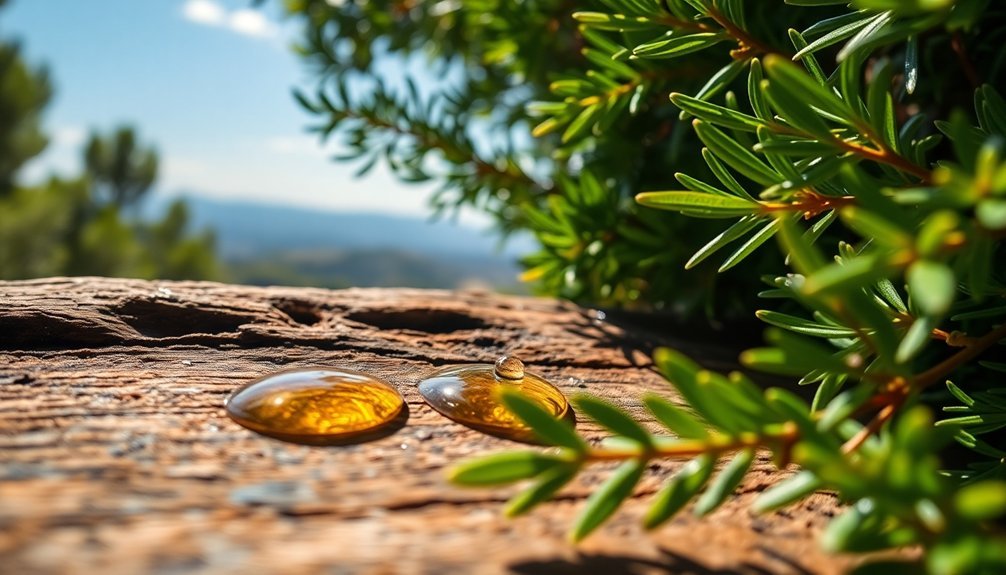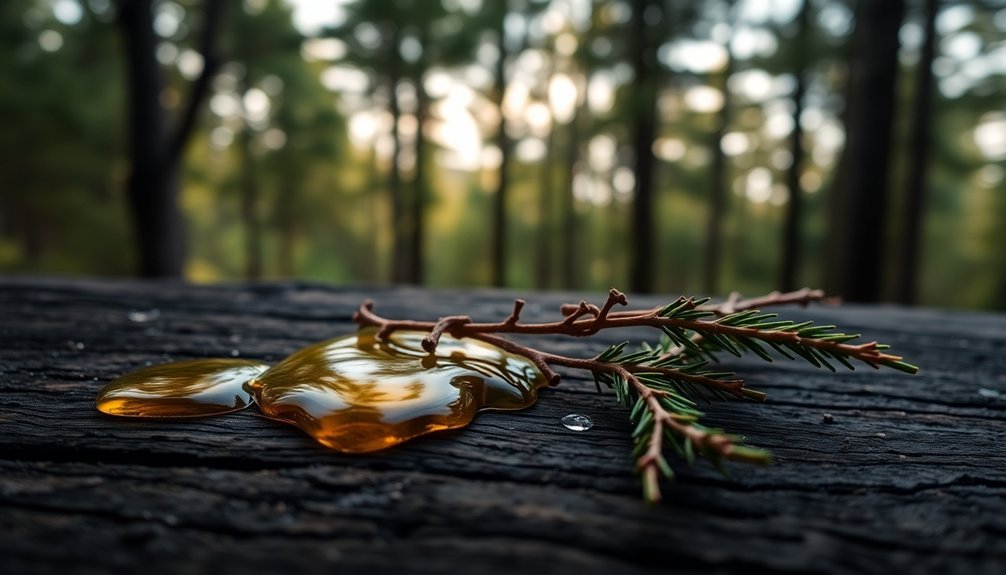Cypress oil's unique combination of fresh evergreen top notes and deep resinous undertones makes it your perfect choice for woody perfumes. You'll find its complex aroma profile, featuring α-pinene and cedrol, creates depth while maintaining balance. It blends seamlessly with other woody elements like cedar and sandalwood, while its natural staying power guarantees your fragrance lasts. The oil's versatility lets you craft sophisticated scents that evolve from crisp forest freshness to warm, enduring base notes. The ancient Mediterranean's aromatic secrets await your discovery.
The Natural Essence of Mediterranean Cypress

A botanical marvel, the Mediterranean Cypress stands as one of nature's most enduring trees, gracing the landscapes from Southern Europe to Iran.
You'll find these majestic evergreens reaching heights of up to 115 feet, their slender forms defining the coastal regions of France, Spain, and North Africa.
When you encounter a Cypress tree, you're meeting a living emblem of longevity – some specimens have thrived for over 4,000 years.
Their Latin name, sempervirens, perfectly captures their eternal nature, meaning 'lives forever.'
This durability extends to their wood, which resists decay so effectively that ancient Greeks chose it for crafting statues of their gods.
The tree's centered energy and upright growth pattern have made it a powerful symbol of endurance and spirituality across Mediterranean cultures.
The essential oil extracted from these magnificent trees offers a deep, woody-green aroma that perfectly captures the essence of Mediterranean forests.
Understanding Cypress Oil's Distinct Aroma Profile
You'll notice cypress oil's complex aroma immediately through its fresh evergreen base notes, which provide a foundation reminiscent of pine forests.
The oil's woody-balsamic heart character emerges as the scent develops, creating a warm and resinous middle note that's prized in perfumery. The chemical compound α-pinene contributes significantly to this distinctive woody profile.
Nature's smoky nuances complete the profile, adding subtle depth and sophistication that makes cypress oil an exceptional choice for woody fragrance compositions.
Fresh Evergreen Base Notes
While many essential oils offer singular aromatic notes, cypress oil stands out for its complex and layered profile that combines fresh herbaceous top notes with deep resinous undertones.
You'll discover a crisp, invigorating scent that's reminiscent of a dense forest after rainfall, making it perfect for woody perfume compositions.
When you're working with cypress oil, you can blend it seamlessly with other evergreen oils like balsam fir needle, black spruce, and cedar to create sophisticated fragrances. As demonstrated in the fragrance "Olympic Amber," cypress oil blends harmoniously with various perfume elements.
The oil's versatility shines as it acts as an excellent middle note, balancing and harmonizing various scent elements without overpowering them.
For the best results, you'll want to combine it thoughtfully with complementary notes like grapefruit or florals, ensuring the pine-like qualities don't become too dominant.
Woody-Balsamic Heart Character
Diving into cypress oil's distinct aroma profile reveals a sophisticated heart character that balances woody and balsamic elements.
You'll discover a crisp, green essence that's enhanced by subtle spicy undertones and herbaceous notes, creating a complex fragrance that's both fresh and grounding.
When blending cypress oil, you'll find it excels at creating depth in woody perfumes through its:
- Fresh coniferous top notes that shift smoothly into the heart
- Resinous undertones that add richness and complexity
- Light, sweet earthiness that differentiates it from pine
- Balsamic nuances that create a bridge to other fragrance families
This versatile oil's ability to complement both woody and citrus notes makes it invaluable in perfumery, especially when you're crafting fougère, amber, or chypre compositions.
Nature's Smoky Nuances
Nature's unique chemistry reveals itself through cypress oil's intricate smoky nuances, where monoterpenes and sesquiterpenes create a sophisticated interplay of aromas.
You'll detect α-pinene and δ-3-carene contributing fresh, pine-like notes, while cedrol adds a calming depth to the composition.
The oil's smoky character becomes more pronounced in certain varieties, particularly Australian Cypress, where you'll find distinctive dry middle notes that evoke memories of dense forests after rainfall.
These natural smoky undertones are beautifully complemented by myrcene's earthy, musky presence.
Whether you're working with Cupressus sempervirens or Cupressus lusitanica, you'll notice how the steam distillation process captures the complete aromatic spectrum, from crisp top notes to deep, woody base notes.
Extraction Methods That Preserve Woody Notes

To preserve the distinct woody notes of cypress oil, manufacturers primarily rely on steam distillation as their extraction method of choice. This gentle process captures the full aromatic spectrum, from fresh resinous top notes to deeper balsamic undertones, while ensuring maximum quality and yield.
While you'll find some producers using a hybrid approach that combines steam distillation with supercritical CO2 extraction, the traditional steam method remains superior for preserving woody characteristics.
Here's why steam distillation stands out:
- Captures the complete aromatic profile without degradation
- Maintains the oil's bright, green, and earthy qualities
- Preserves the invigorating sharpness essential for woody perfumes
- Delivers consistently high yields with minimal compound loss
When it comes to cypress oil extraction, simpler often proves better, making steam distillation the industry standard.
Key Compounds Behind Cypress's Woody Character
The distinctive woody character of cypress oil emerges from a complex interplay of chemical compounds, with monoterpenes playing the leading role.
You'll find α-pinene and δ-3-carene providing the fresh, pine-like aroma, while myrcene adds earthy undertones and enhances the absorption of other components.
The deeper woody notes come from sesquiterpenes, particularly cedrol, which brings a grounding effect and calming properties to the oil.
Terpinen-4-ol, a monoterpenoid alcohol, contributes fresh, herbaceous notes while offering protective benefits.
Together, these compounds create cypress oil's forest-like quality that you'll recognize by its fresh, woody, and slightly herbaceous character.
It's this unique combination that makes cypress oil so versatile in perfumery, supporting everything from floral to citrus and gourmand fragrances.
Blending Cypress Oil With Other Woody Elements

You'll find Cypress oil pairs exceptionally well with other woody essential oils, particularly Cedar's crisp notes and Sandalwood's smooth, creamy character.
When layering Pine with Cypress, you can create an authentic forest atmosphere that captures the essence of a coniferous woodland.
The natural synergy between Cypress and Sandalwood produces a sophisticated woody base that's perfect for both masculine and unisex fragrances.
Harmonizing With Cedar Notes
While many perfumers appreciate cypress oil's versatility, its natural compatibility with cedarwood creates an especially sophisticated and grounding fragrance combination.
You'll find that these two oils complement each other perfectly, with cypress serving as a middle note and cedarwood as a base note, creating a balanced woody accord that evokes memories of the outdoors.
When you're working with cypress and cedarwood, you can enhance your blend by:
- Adding citrus top notes for extra freshness
- Incorporating floral middle notes like lavender for depth
- Including earthy elements such as patchouli for grounding
- Blending with pine or sandalwood for complexity
This harmonious combination isn't just for perfumes – you'll find it's excellent for aromatherapy, natural deodorants, and massage oils, offering both therapeutic benefits and a sophisticated scent profile.
Layering Pine And Cypress
Building on the natural affinity between cypress and woody notes, combining cypress with pine creates a particularly compelling forest-inspired accord.
You'll find that cypress adds a grounding quality to pine's brightness, resulting in a balanced and harmonious blend that captures the essence of a dense forest after rainfall.
When you layer these two oils, you'll experience how cypress's fresh, woody, and slightly spicy character complements pine's invigorating nature.
The combination delivers crisp, resinous top notes while maintaining deeper, balsamic undertones.
If you're crafting fresh, outdoorsy fragrances, this pairing proves especially effective.
You can further enhance the blend by incorporating other woody elements like juniper berry or silver fir, creating a more complex and authentic forest-inspired fragrance that's both rejuvenating and sophisticated.
Sandalwood Cypress Synergy
When paired with sandalwood, cypress oil creates a remarkable harmony that combines earthiness with invigorating woody undertones.
You'll find this sophisticated blend perfectly balances the green, resinous notes of cypress with sandalwood's creamy depth, creating an unforgettable forest-like ambiance.
The cypress-sandalwood combination offers these key benefits:
- Adds clarity and dimension to woody base notes
- Creates a modern yet timeless fragrance profile
- Provides both grounding and uplifting qualities
- Evokes the essence of a misty forest atmosphere
This synergistic blend works exceptionally well in contemporary perfumery, as demonstrated in popular fragrances like Diptyque's Tam Dao.
You'll notice how cypress supports sandalwood by introducing a fresh, slightly spicy character while maintaining the composition's sophisticated woody core.
Creating Depth in Perfumes With Cypress Notes
To create truly sophisticated fragrances, perfumers rely on cypress oil as a masterful depth-builder in woody compositions. You'll find that cypress oil adds complexity without overwhelming other notes, making it perfect for balancing your favorite scents. It's particularly effective at preventing florals from becoming too sweet while adding a fresh, green dimension.
| Cypress Pairing | Effect | Example Perfume |
|---|---|---|
| Citrus Notes | Bright & Invigorating | Fresh Compositions |
| Spicy Notes | Warm & Complex | Guerlain Heritage |
| Floral Notes | Balanced & Green | Rose Combinations |
| Woody Notes | Deep & Earthy | Chanel Sycomore |
When you're looking for that perfect balance in a woody fragrance, cypress oil delivers both warmth and freshness. It's especially effective when combined with sandalwood, cedar, or vetiver, creating fragrances that evoke serene forest landscapes while maintaining sophistication.
The Art of Balancing Cypress in Fragrance Compositions

The art of balancing cypress in fragrance compositions requires a keen understanding of proportions and complementary notes.
You'll find that cypress blends beautifully with various scent families, creating sophisticated and dynamic fragrances. When working with woody bases, it adds clarity and depth while maintaining a fresh, invigorating profile.
To achieve the perfect balance with cypress, consider these essential guidelines:
- Pair with cedar and sandalwood for a warm, comforting foundation
- Add citrus notes like bergamot or lemon for brightness and lift
- Blend with florals to create soft, harmonious accords
- Incorporate spices and resins for smoky depth
Remember to adjust cypress concentrations based on your desired outcome, whether you're creating perfumes, room sprays, or personal care products.
The key is maintaining high-quality ingredients and proper storage to preserve the oil's authentic character.
Traditional Uses of Cypress in Classic Perfumery
Since ancient civilizations first discovered its enchanting properties, cypress has played a pivotal role in classic perfumery. You'll find cypress essential oil in both traditional and modern fragrances, where it's prized for its versatile woody character and spiritual associations.
| Classic Use | Modern Application |
|---|---|
| Funerary Scents | Fresh Woody Perfumes |
| Religious Incense | Men's Colognes |
| Protective Blends | Unisex Fragrances |
| Spiritual Oils | Natural Perfumery |
When you explore classic perfume compositions, you'll notice cypress often paired with cedar, pine, or lavender. Its ability to work in both top and base notes makes it exceptionally valuable. The oil's extraction through steam distillation of branches and leaves, particularly from Mediterranean regions like Provence and Tuscany, continues to provide the highest quality ingredient for sophisticated fragrances.
Modern Applications in Contemporary Fragrances

You'll find cypress oil's distinctive woody profile anchoring many contemporary designer perfumes, from Chanel's sophisticated Sycomore to Guerlain's complex Heritage.
The oil's versatility shines when paired with complementary notes like vetiver, sandalwood, and spices, creating rich layered compositions that feel both modern and timeless.
In natural perfumery, cypress serves as an excellent woody base note that adds depth and freshness while allowing other ingredients to shine through the composition.
Designer Perfume Signature Notes
Modern perfumery has revolutionized designer fragrances through innovative combinations of signature notes and contemporary applications.
When you select a designer perfume, you're choosing a unique blend of top, middle, and base notes that create a personal story through scent. Contemporary perfumers craft distinctive signatures by combining versatile ingredients from various fragrance families.
Your signature scent should reflect your personality through these essential elements:
- Initial impact through volatile top notes lasting 5-15 minutes
- Heart notes forming the fragrance's core character for 3-5 hours
- Long-lasting base notes providing 8+ hours of depth
- Unique accords that blend multiple notes into one distinctive experience
These carefully crafted combinations guarantee your chosen fragrance delivers both immediate appeal and lasting impression, making each designer perfume a truly individual expression.
Natural Woody Base Layers
Natural woody base layers form the foundation of contemporary fragrance design, anchoring scents with rich, enduring notes that evolve throughout the day. You'll find these layers expertly blended in modern perfumery, where they're combined with citrus, florals, and oriental spices to create complex, sophisticated fragrances.
| Base Note | Key Characteristics |
|---|---|
| Sandalwood | Sweet, sensual, creamy |
| Patchouli | Rich, earthy, wet |
| Cedarwood | Fresh, earthy, resinous |
| Vetiver | Smoky, grounding, deep |
| Oud Wood | Balsamic, sensual, deep |
These natural woody bases aren't just for traditional perfumes – you'll discover them in everything from luxury candles to body care products. Their versatility makes them perfect for creating gender-neutral scents that appeal to contemporary consumers while maintaining the timeless appeal of natural wood essences.
Seasonal Characteristics of Cypress-Based Scents
While cypress oil maintains its distinct woody character throughout the year, its versatility shines differently across seasons.
You'll find it adds crisp, fresh notes in spring and summer fragrances, especially when paired with citrus and floral accords.
In autumn, it delivers deeper woody warmth, blending beautifully with spices and resins, while winter compositions benefit from its rich, sensual qualities alongside leather and incense notes.
Here's how cypress adapts across seasons:
- Spring/Summer: Light and invigorating with citrus and green notes
- Autumn: Smoky and resinous, complementing spicy oriental blends
- Winter: Warm and mysterious, paired with leather and tonka bean
- Year-round: Maintains its sophisticated woody foundation while adapting to seasonal companion notes
This adaptability makes cypress oil a cornerstone ingredient in woody perfumes throughout the year.
Enhancing Longevity of Cypress Notes

Beyond its seasonal adaptability, cypress oil's lasting power sets it apart in woody perfumes. You'll find its stability particularly impressive when you blend it strategically with complementary notes.
To maximize longevity, pair cypress with other woody oils like cedarwood or sandalwood, or anchor it with resinous elements such as frankincense and myrrh.
You can enhance the lasting impression by positioning cypress as a middle or base note in your composition. Its profound, balsamic undertones will persist throughout the day, while its fresh, resinous top notes create an immediate impact.
For peak staying power, consider combining cypress with tonka bean or leather notes. The oil's natural stability guarantees your fragrance maintains its woody character even after hours of wear.
Crafting Your Signature Woody Blend
Creating your signature woody blend starts with understanding cypress oil's distinct characteristics. Its fresh, woody aroma with resinous undertones makes it an excellent foundation for a personalized fragrance.
You'll find that cypress pairs beautifully with other notes to create depth and dimension in your blend.
To craft a balanced woody perfume with cypress, consider these essential combinations:
- Layer with citrus oils like bergamot for a bright, uplifting effect
- Add sandalwood or cedar to enhance the woody character
- Include spicy notes like ginger for warmth and complexity
- Balance with light florals such as jasmine to soften the composition
Remember that cypress's versatility allows you to experiment with different ratios until you achieve your desired scent profile.
Start with small amounts and adjust gradually to maintain the harmony between notes.
Frequently Asked Questions
Can People With Sensitive Skin Safely Use Cypress Oil in Perfumes?
You'll need to be cautious with cypress oil if you have sensitive skin. Always dilute it properly and do a patch test first. If you experience any irritation, it's best to avoid using it.
How Does Altitude Affect the Scent Profile of Cypress Oil?
You'll notice that higher altitudes create more concentrated cypress oils with intense woody notes, while lower elevations produce lighter, fresher scents due to differences in growth rates and environmental stressors.
Does the Age of Cypress Trees Influence Essential Oil Quality?
While cypress trees can live for thousands of years, you'll find that a tree's age doesn't directly affect oil quality. It's the tree's health, growing conditions, and extraction process that determine essential oil excellence.
Why Do Cypress-Based Perfumes Smell Different on Different People?
Your unique skin chemistry, genetics, and environment affect how cypress-based perfumes smell on you. Your body's pH levels, natural oils, and temperature interact with the fragrance, creating a personalized scent experience.
Can Cypress Oil Perfumes Be Worn in Hot, Humid Climates?
You'll need to apply cypress perfumes carefully in hot, humid weather. While they can work, you should reapply more frequently and store the fragrance properly to prevent degradation from heat and moisture.
In Summary
You'll find cypress oil to be a remarkable foundation for woody perfumes, thanks to its versatile profile and natural staying power. Whether you're creating your own signature scent or exploring commercial fragrances, this Mediterranean gem delivers authentic forest notes that blend seamlessly with other woody elements. By understanding its unique properties and proper blending techniques, you can craft enduring fragrances that capture nature's timeless essence.





Leave a Reply